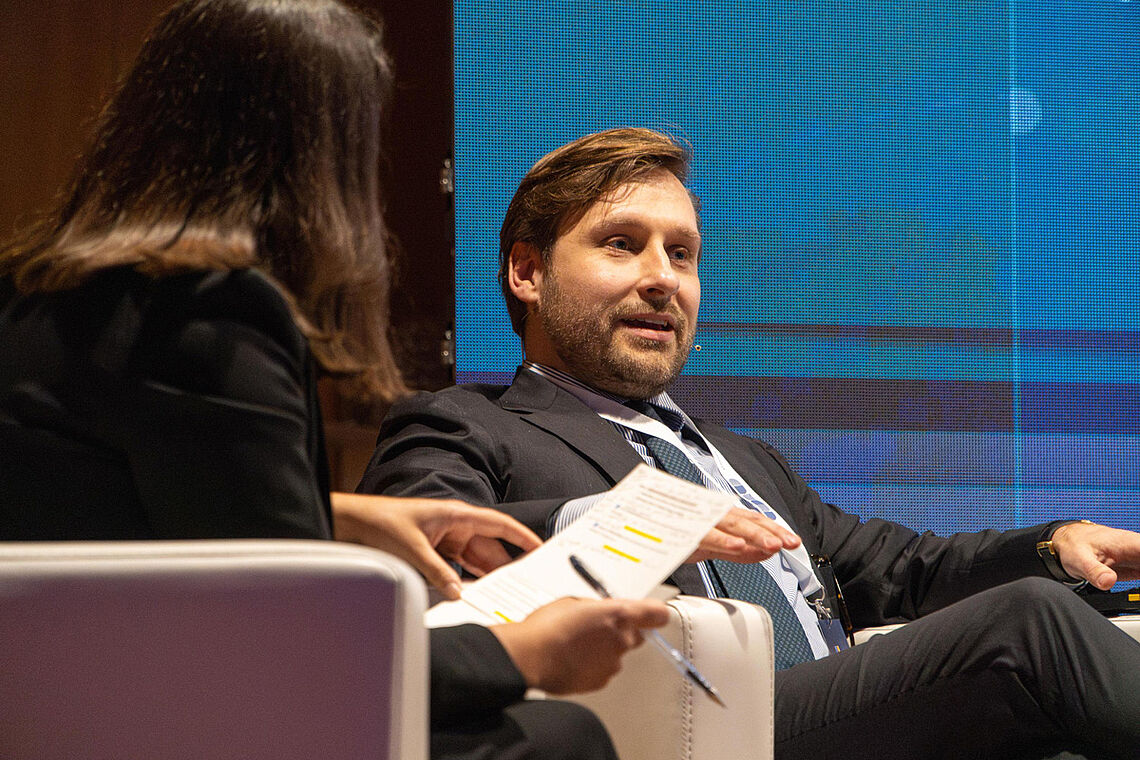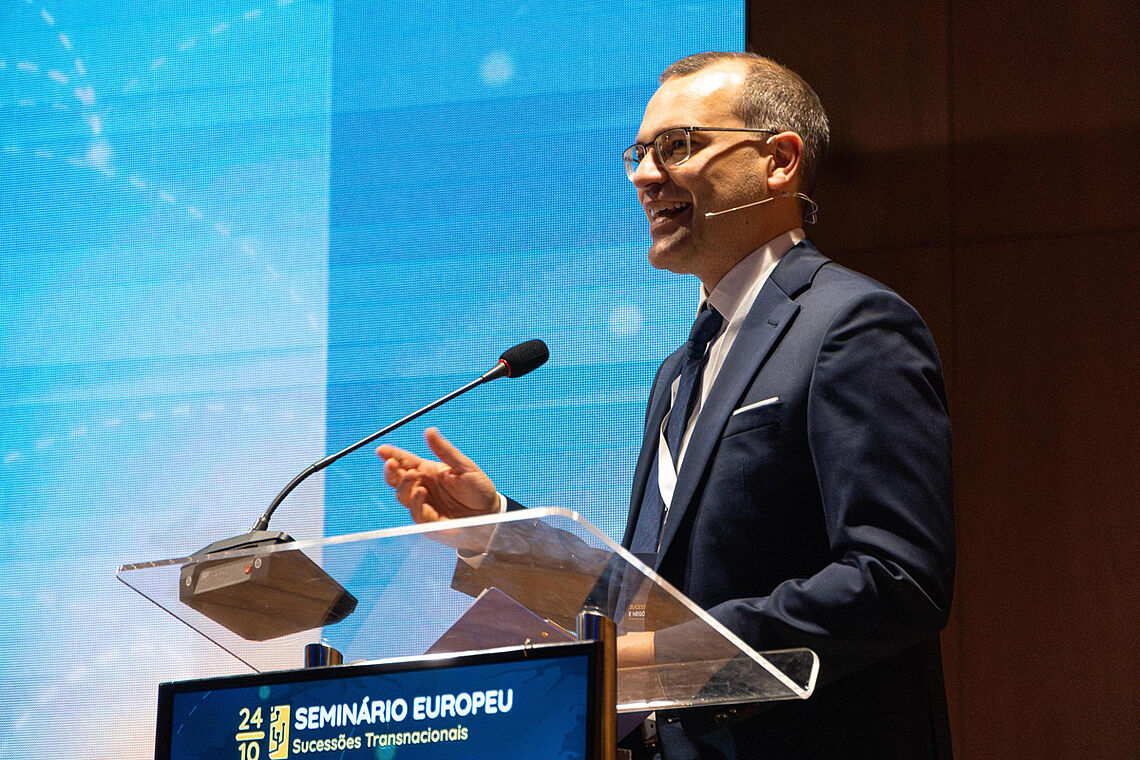The European training seminar held in Porto on 24 October 2025 stands as a prime example of the successful training efforts undertaken by the Council of the Notariats of the European Union (CNUE). Under the umbrella of the European Notarial Network (ENN) and within the framework of the “E-learning for Notaries” (EL@N) projects, new and dynamic forms of continuing education are being developed by European Notaries – ranging from in-person seminars and webinars to interactive digital learning modules. The overarching objective is to further strengthen professional competence in dealing with cross-border matters and to foster lasting cooperation between notaries across national boundaries.
European Training for Notaries
The continuous training and further education of notaries in Europe is a central concern of the CNUE. Since 2014, thanks to a series of training programmes supported by the European Commission, almost 6,000 notaries have been able to participate in training courses on European law or foreign legal issues from other Member States.
The programmes focus on areas of significant practical and cross-border relevance, including succession and family law, data protection and company law, as well as the prevention of money laundering and terrorist financing.
The aim is to further strengthen the professional competence of notaries in the European context and to promote cross-border exchange. With a modern training system comprising in-person seminars, webinars, e-learning modules and topic-specific European training initiatives, the CNUE supports the continuous development and European networking of the notarial profession.
The Council of Notaries of the European Union
The CNUE is the official body representing the notarial profession in its relations with the European institutions. It brings together the notariats of 22 Member States, representing around 50,000 notaries across Europe. Established in 1993, following the completion of the EU’s internal market, the CNUE has operated since 2003 as a non-profit association under Belgian law (ASBL) based in Brussels. Its mission is to strengthen the notarial profession as a guarantor of legal certainty and consumer protection, to promote its active participation in European decision-making processes, and to keep member notariats informed of developments in EU law. In addition to independent initiatives – such as the European Directory of Notaries – the CNUE is also involved in the professional training of notaries.
The European Notarial Network
The ENN is an initiative of the CNUE and operates with the support of the European Commission. It serves as a central point of contact for notaries dealing with cross-border matters, for example in the fields of succession, family or company law. Through national contact points established in all Member States with Latin-type notarial systems, the ENN provides a structured network for the exchange of information and best practices.
Since 2023, the ENN has also hosted a dedicated e-learning platform developed by the CNUE, specifically designed to meet the practical training needs of the notarial profession. The platform primarily features the digital content of the European training programme EL@N. In addition, the CNUE organises ENN seminars, which further deepen professional exchange and cooperation among European notaries.
The EL@N Project
The EL@N project, launched in 2020, is an initiative co-financed by the European Commission and led by the CNUE. The first phase, “EL@N I” (2020–2022), aimed to promote legal training for notaries across Europe and to establish a sustainable framework for future training series. EL@N I combined in-person seminars held in various European cities with digital learning formats, focusing on family law, company law, and data protection law.
Building on the success of the initial programme, “EL@N II” (2024–2026) was launched to further deepen and expand the existing training measures. The project addresses key areas of growing importance in notarial practice, including:
- the European Succession Regulation, with particular emphasis on the impact of matrimonial property regimes on succession law, as well as the handling of digital inheritance;
- the prevention of money laundering and terrorism financing, in line with the new anti-money laundering (AML) package harmonising AML rules throughout the European Union;
- the cross-border enforcement of authentic instruments; and
- the strengthening of English legal terminology within notarial practice.
EL@N II seminar in Porto on Cross-Border Successions
The relevance of European inheritance law is particularly evident in its economic dimension: according to the European Commission, there are around 450,000 cross-border inheritance cases in the European Union each year, with a total value estimated at approximately €123 billion. Questions of jurisdiction, applicable law and the recognition of decisions therefore affect a significant proportion of European citizens and regularly present notaries with complex challenges.
Against this backdrop, the in-person seminar held in Porto on 24 October 2025 as part of the EL@N II project was of particular significance, as reflected in the exceptionally high number of participants: with more than 250 attending in person and numerous others participating online, it was the most well-attended seminar in the EL@N series. The event was jointly organised by the CNUE and the Portuguese Chamber of Notaries (Ordem dos Notários). It focused on the legal and practical challenges of cross-border inheritance cases from a notarial perspective, paying special attention to the distinction between succession law and matrimonial property law. The seminar offered in-depth theoretical insights, valuable practical guidance, and provided an excellent platform for professional exchange between notaries and academic experts from various Member States.
The opening ceremony was accompanied by music performed by Filipa Azevedo Maia, Vice-President of the Portuguese Chamber of Notaries, before President Jorge Batista da Silva kicked off the event with his inspiring speech, which was followed by presentations from high-ranking experts. Professor Anabela Susana de Sousa Gonçalves (University of Minho) and Sofia Henriques (notary in Lisbon and professor at the University of Lisbon) opened the discussion on the limits of the scope of application of the European Succession Regulation, highlighting its distinction from the Matrimonial Property Regimes Regulation. João Oliveira then presented the Portuguese IT platform for the European Certificate of Succession (ECS), while Professor Carolina Gouveia Costa (University of Coimbra) and Isidoro Calvo Vidal (notary in A Coruña) examined the effects of the ECS as a “passport for heirs”.
The afternoon sessions were equally devoted to practical aspects. Professor Rute Pedro (University of Porto) and Christian Schall (notary in Marktheidenfeld) provided an in-depth analysis of the Mahnkopf case (C-558/16), in which the ECJ answered the controversial question of how the provision in Section 1371 (1) of the German Civil Code (BGB) should be classified under private international law. Joan-Carles Rodríguez Miñana (notary in Andorra) and Professor Jéssica Ferreira (University of Porto) discussed the challenges arising from migration and increasing mobility for cross-border succession cases – an issue of growing practical relevance throughout Europe. In the concluding panel, Geraldo Ribeiro (judge in Coimbra) and Felix Koechel (notary in Waldshut-Tiengen) addressed the dogmatic and practical significance of the “acceptance” of authentic instruments under the European Succession Regulation, explaining why the concept of “recognition” applies exclusively to judicial decisions.
In her closing remarks, Filipa Azevedo Maia, Vice-President of the Portuguese Chamber of Notaries and member of the Executive Board of the Union Internationale du Notariat (UINL), emphasised the growing importance of the EL@N training initiatives, which not only foster a shared understanding of EU law, but also promote personal and professional networking among European notaries.
Outlook – EL@N III
Based on previous initiatives, the European Commission has now also accepted the “EL@N III" project (2026–2028). In this new phase, the training of European notaries is to be further expanded and specifically geared towards the challenges of digital transformation and corporate mobility. EL@N III will focus on two strategic priorities:
- Digital Capacity for Notaries: training courses on topics such as cyber security, secure communication, digital document management, crypto assets and money laundering prevention.
- Company Mobility: practice-oriented modules on registers of beneficial owners, implementation of relevant EU directives and use of the Business Register Interconnection System (BRIS).
The programme will once again follow the proven approach of combining online learning modules via the ENN platform with in-person seminars in several Member States and webinars. It will be supplemented by a new exchange format that promotes knowledge transfer and personal networking between European notaries.
EL@N III aims to further develop the training of the European notarial profession in an innovative, practice-oriented and forward-looking manner.




![[Translate to Englisch:] [Translate to Englisch:]](/fileadmin/_processed_/7/c/csm_GettyImages-2166322635_1200x800_55538b1464.jpg)

